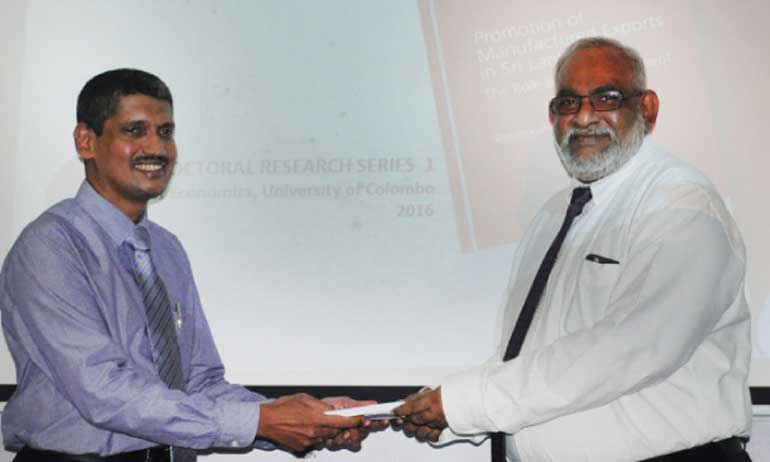Monday Feb 23, 2026
Monday Feb 23, 2026
Monday, 4 July 2016 00:00 - - {{hitsCtrl.values.hits}}

Shanthi Kumar Fernanado,Chief Manager of Commercial Bank, Research & Development Department and Author of ‘Promotion of Manufactured Exports in Sri Lanka, The role of the Government’ formally releasing his book at the premises of the Economic Department of University of Colombo on 30 June 2016. Chief Guest, Jegan Durairatnam, Managing Director Commercial bank of Ceylon Plc, Prof. Wijithapure Wimalarathane, HOD Economic Department, University of Colombo, Rt. Rev. Kenneth Fernanado, Chitra Fernanado, Lakshmi Fernanado, Navidu Fernanado and Extreme left Prof. Sirimal Abeyratne were also present in the occasion.Pix by Gitika Talukdar

Shanthi Kumar Fernanado, Author of “Promotion of Manufactured Exports in Sri Lanka,The role of the Government” formally handed over his book to the Chief Guest, Jegan Durairatnam, Managing Director Commercial bank of Ceylon PLC during launching ceremony at premise of Economic Department of University of Colombo on 30th June 2016.
The Department of Economics of the University of Colombo has launched a Doctoral Research Series.
The first publication under this research series has now been published as a book titled “Promotion of Manufactured Exports in Sri Lanka - The Role of the Government.” Its author is Shanthikumar Fernando.
Fernando counts over two decades of experience in the field of economic research in the private sector. Having completed his schooling at Royal College, Colombo, he has earned a BA (Hons) in Economics, an MA in Economics and a PhD in Economics at the Department of Economics, University of Colombo.
The book which was Fernando’s PhD thesis looks at “what is the role of the government in promoting manufactured exports in developing countries? ”. Along with an investigation into the theoretical underpinnings and empirical evidence of the issues that have constituted the current trade debate, the study was centered on the case of Sri Lanka – a developing country in the Asian region that had embarked upon policy reforms much earlier than many other countries in the region.
Sri Lanka’s drive for export-led growth has been hampered by macroeconomic imbalances and policy deficiencies throughout the post-liberalisation period. The strategy of selective intervention by different governments has resulted in a dismal outcome. The theoretical underpinnings and empirical evidence suggest that policies which are neutral between those goods produced for the export market and those that are produced for the domestic market, lead to a superior outcome, by allowing comparative advantage to assert itself. In this context, the government has a specific role to play. As the research findings from Sri Lanka quite convincingly demonstrate, the role of the government should be one of complimenting the market rather than selectively promoting some sectors over and above the others. As revealed by the sample survey findings, the government of Sri Lanka has a very specific facilitating role to play, particularly in relation to locally owned manufactured export companies, in areas such as research and development (R&D), human capital development, and in facilitating expansion into new export markets. However, government should be careful to provide such facilitation that may be deemed necessary, in a trade neutral manner, in keeping with the principle of maintaining policy neutrality between those goods produced for the domestic market and those that are produced for the export market, so that comparative advantage can assert itself, thereby leading to a superior outcome.
Additionally, the sample survey revealed several grievances concerning the efficiency of manufactured exporters and /or competitiveness of manufactured exports such as cumbersome government rules; inefficiency at government departments; inadequate coordination between government agencies; inadequate lobbying by the government for preferential market access; lack of firm direction on the part of the government in promoting manufactured exports; rigid labour laws and regulations; high utility charges; and policy deficiencies in relation to the management of the currency exchange rates. Urgent government remedial action is required to address these grievances. Additionally, the government should take steps to rapidly dismantle the current protectionist trade policies.
The findings of the study as a whole, quite convincingly demonstrate that the role of the government should be one of complimenting the market, rather than selectively promoting certain manufactured export sectors over and above the others, in the conventional sense of the current trade debate.